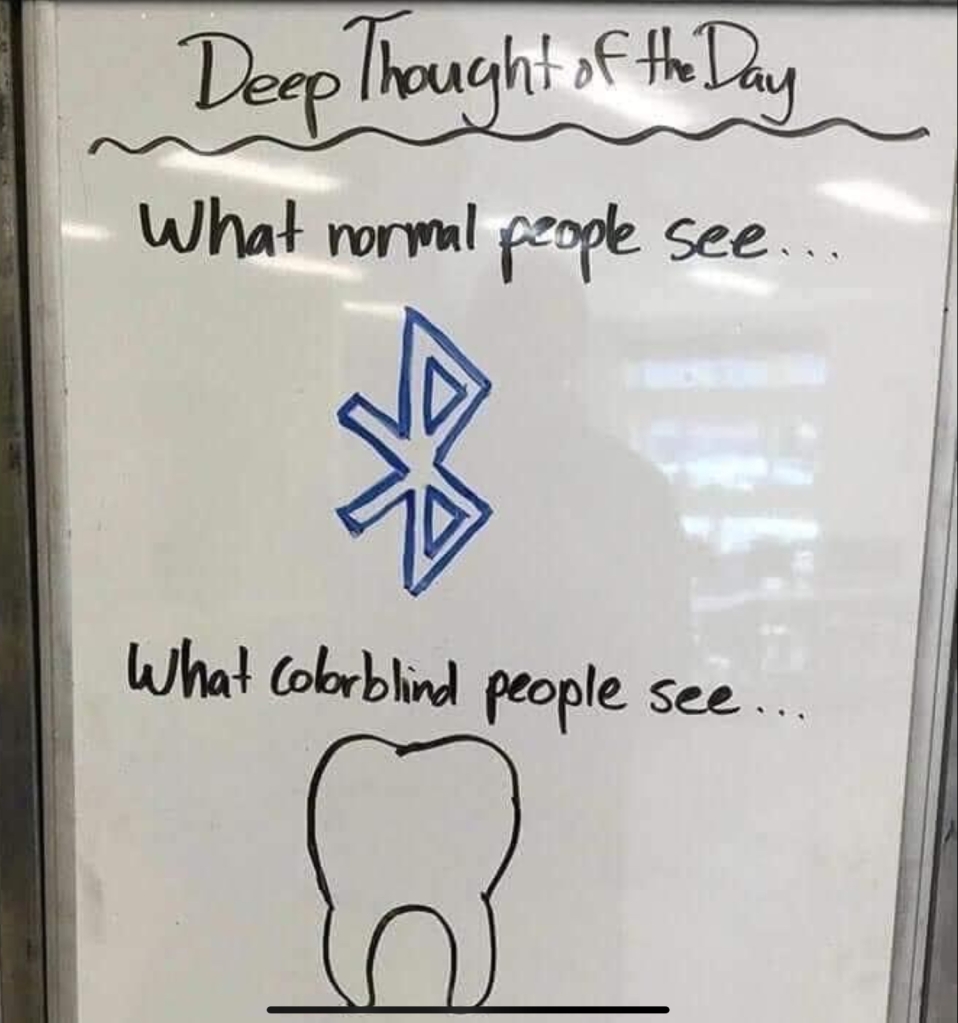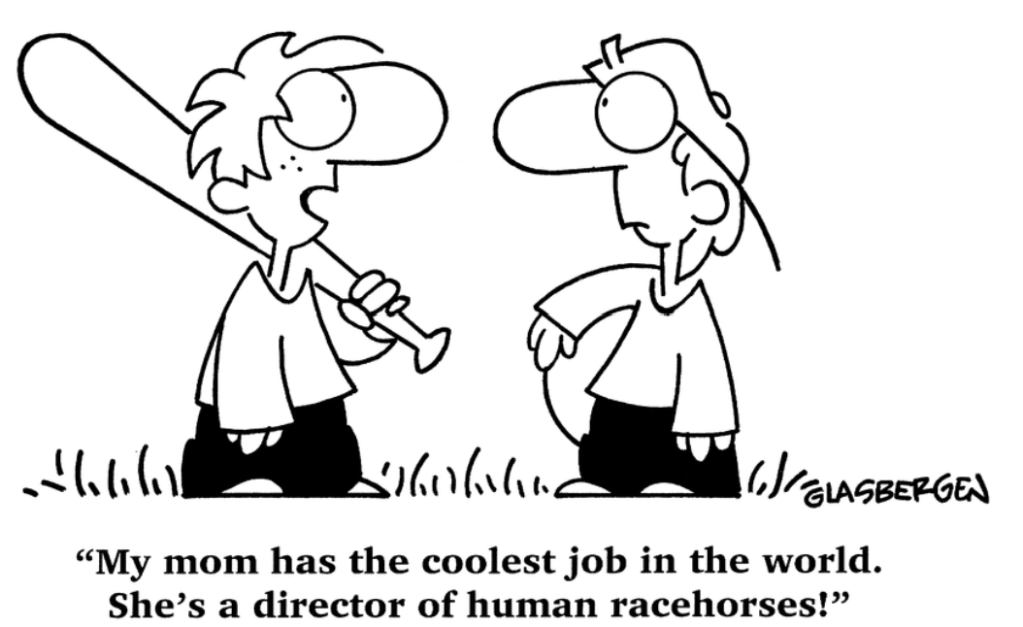


Rather dumb word-argument. But it prompts memory of an assortment of senior-targeted advertising campaigns which for a while used the phrasing “age 50 or better” or “age seventy-and-a-half or better” etcetera. It was supposed to be obvious, yet a sort of joke, that better would mean older. At least one that I heard regularly for a while did change to older; but then later reverted to better ; so I guess there was some complaint but it got resolved, or just overruled.



Come to think of it, probably the word-level associations of squashing things must have played a role in my lifelong aversion to the vegetable of that name.

Chak notes “I’ve read En attendant Godot several times, and I still don’t have a clue.”
Could one expect Godot to comment? Waiting for your comments below.

The two picture-puns at the top were not really perfect, by my lights, but nonetheless: Bluetooth vs just any tooth; and the Space Bar.
Fun fact: The Bluetooth logo derives from the personal rune of Harald Bluetooth, a Norse leader of some renown.
sorry, in that type of colorblindness, shouldn’t the ‘opposite’ be a green molar?
I assume the Godot gag is just a reference to the fact that he never shows up. Wait for Godot? He no-shows. Reach out to Godot for comment? He doesn’t reply.
@Andrew Millar, so I was just overthinking it? Okay, I can live with that. Thanks
@Powers, That’s really cool! Thanks
shouldn’t the ‘opposite’ be a green molar?
Well, the “opposite” of blue is yellow, but red/green colorblindness is more common. They’re only “opposites” because the neurons happen to differentiate between two colors: in one kind it’s either red, or it’s green, and in the other kind it’s either blue, or it’s yellow. But if you have that kind of color blindness, it means you can’t differentiate between the colors in question — they both look more or less the same to you.
(NB: this is a different neuronal layer than the three cones that detect red, green, and blue — no matter how many times I read up on it, I still come away a little confused: are these two parallel systems that evolved more or less independently, or are they hierarchical layers of the perception system, first you go through RGB with three cones, then its refined as it’s passed through these red/green and yellow/blue neurons?)
The end of Waiting For Godot is this:
ESTRAGON:Well, shall we go?
VLADIMIR:Yes, let’s go.
They do not move.
The last line of dialogue is “go” followed by a dot (aka full stop, period). Go, dot. Godot. The whole play they’re just waiting for the end of the play, but even when “go, dot” appears they don’t move.
Since there are over 300 Grateful Dead tribute bands out there, genetics is kind of useless.
One problem with the “go, dot” theory is that the play was originally written in French
VLADIMIR. – Alors, on y v a ?
ESTRAGON. – Allons-y.
Ils ne bougent pas.
But maybe while writing En attendant Godot Becket had the English Go, Dot idea in his mind and it was a translanguagational blague. Perhaps he should have called it En attendant Alain C Pointflor the avoidance of doubt.
(Right now I am in the Dordogne in France, not that that helps.)
I played a bit with a game development system called Godot. There was some discussion about the pronunciation. I seem to recall that the originators intended it to be Go Dot, for some reason. However, most seem to pronounce it similar to the play.
As a former Miamian, I like to point out that the original American production in 1956, starring Bert Lahr and E.G. Marshall, before moving to New York, opened at the Coconut Grove Playhouse.
My favorite Beckett works are probably :
3) How It Is (Comment Ç’est), originally written in French, novel from 1961; SB had not completed any novel-length prose works thru most of the 1950s, following the Trilogy. Amazing vision of the monologues of a man living on a planet of mud, where he crawls forward every day to nowhere new, and casually tortures another inhabitant, and in turn receives tortures, and has some sort of vision or memory of a world more like our own.
2) Watt. Written in English in wartime, this novel is playful with combinatoric joking, anticlericalism, and absurdism. Example of anticlericalism : Watt looks down a long straight road (maybe with a railroad track?) and sees a distant figure approaching. But due to the distance, and his poor vision, Watt could not tell if the figure be a man; or a woman ; or a priest ; or a nun. / His master commands that the uneaten scraps of his meals be given to the dog. Since there is no dog in the household, Watt thinks over, for many pages, what would be involved in arranging that there should always be a dog to receive the scraps. This could involve hiring a dog breeder, or rather a whole family of dog breeders, for guarantee of continuity.
1) Act Without Words II. A mime-play from the later 1950s. Written in French, and translated by SB. But there is no spoken dialogue, so the text of the play is really extended instructions or stage directions. I’m not a good actor or any sort of stage director of visualizer, so just reading the play doesn’t do much for me — except bring back memory of a great student production I saw in the 1970s, and some fairly good film realizations. It presents, in mime parable, a profound fundamental vision of two ways of living.
When I was a kid, the public library had a recording of the entire stage play Waiting for Godot with Marshall and Lahr. I don’t know what they did on stage, but for the recording they delivered the line “[hanging ourselves] would give us an erection” in French.
narmitaj: You’re stuck in a dog door in France?
Regarding Bluetooth, I recall sagas for Erik the Red, one for a king named Tryggvason, and one for someone named Frithiof, but I don’t recall a saga for Bluetooth.
As far as the colorblindness joke goes, I think the intent is that color is simply absent (accurate or not, I wouldn’t know).
Has anyone done a story centered around characters waiting for a drama production of “Waiting For Godot” that (spoilers) never actually gets underway? :-)
@Grawlix #15
You mean that you are waiting for “Waiting for”Waiting for Godot” “
G
@Grawlix: Harald Bluetooth doesn’t have a saga, but he is a historical Danish king who ruled in the second half of the 10th century. He’s usually credited with introducing Christianity to Denmark, and he also tried to take chunks of Saxony away from the Holy Roman Empire after the death of Otto I. So, no sagas, plenty of historical records.
You’re stuck in a dog door in France?
Sort of… I am having a week of dogsitting for a friend who lives here… Dogdorning, perhaps. Friday a week ago I was minding my own business in the south west of England when he contacted me (the friend, not the dog) as he was returning to Blighty for a week. Flights cheap – £41 return – and timing convenient, so on Sunday I came over, Bristol to Bergerac. Going back Wednesday.
The last proper line of my previous comment should have read “Perhaps he should have called it En attendant Alain C Point for the avoidance of doubt.” Typo caused by an excess of Pineau des Charentes, a local delicacy made of grape juice and Cognac.
For Americans, Alain Z would sound more like Allons-y than Alain C does, but for me it would make Alain Zed.
but for the recording they delivered the line “[hanging ourselves] would give us an erection” in French.
Beckett wrote Krapp’s Last Tape in English (late 1950s), but did the French translation himself, with the title La Dernière Bande. You can see how bande can mean a track on an LP, and by extension a selection on a tape recording, or then in this context an entire tape. But I also recall reading somewhere (could not find it in the Wikipedia entry for the play today) that he expected the word to be recognized as slang for erection.
Another problem with the Go Dot (.) idea is that in 1949, writing in English, Beckett would most likely have known that punctuation mark as a full stop. Dot, IIRC correctly, arose in the computer age, possibly as a means to resolve arguments over whether the character was a period/full stop or a decimal point.
IIRC would have sufficed.
I won’t join in with people complaining about those who say “PIN number”. It’s just natural.
There’s maybe something more out-there about the redundancy when you have an initialism (said as letter names) rather than acronym (said as a word). But even so, with an example like your “IIRC correctly” I’m happy enough to think of the first part as “If I Re Call.”
Mitch4: That seems to give a new meaning to our own favorite, bande dessinée.
Which maybe would describe what the patient had in a certain old joke. The elderly nurse told the young nurse that the patient had a tattoo in an unusual place. “I think it must be a girlfriend’s name. It says ‘Meda’.” The next day the young nurse reported back, “You were wrong. It says ‘Memento of a Visit to Las Vegas Nevada’.”
#16: Yup! :-)
I love to see human racehorses
Re: “Godot” – Today’s “Rhymes with Orange” makes a relevant observation:
Mitch4 – We in NY call that an “out of town opening” which is not uncommon if the play runners want to try the play out first or want to see how the play plays before bringing it here.
Sigh – between the cost of tickets and having had bedbugs we have not gone to see a Broadway show in decades. There was a time when we were young (and tickets were MUCH less expensive – $3US for the Mezzanine at the TKTS booth – half price – was a common enough price) we would see almost every show.